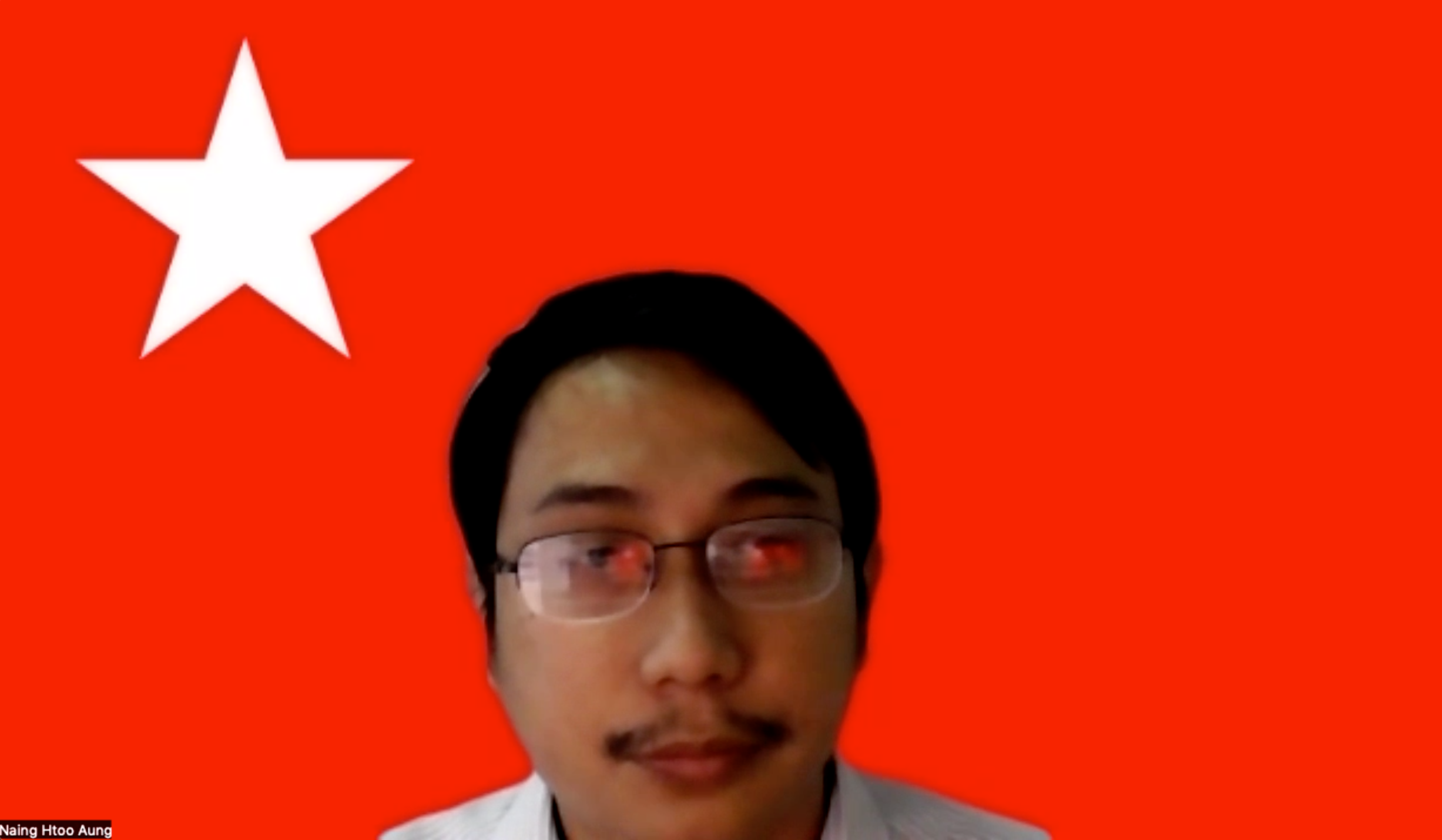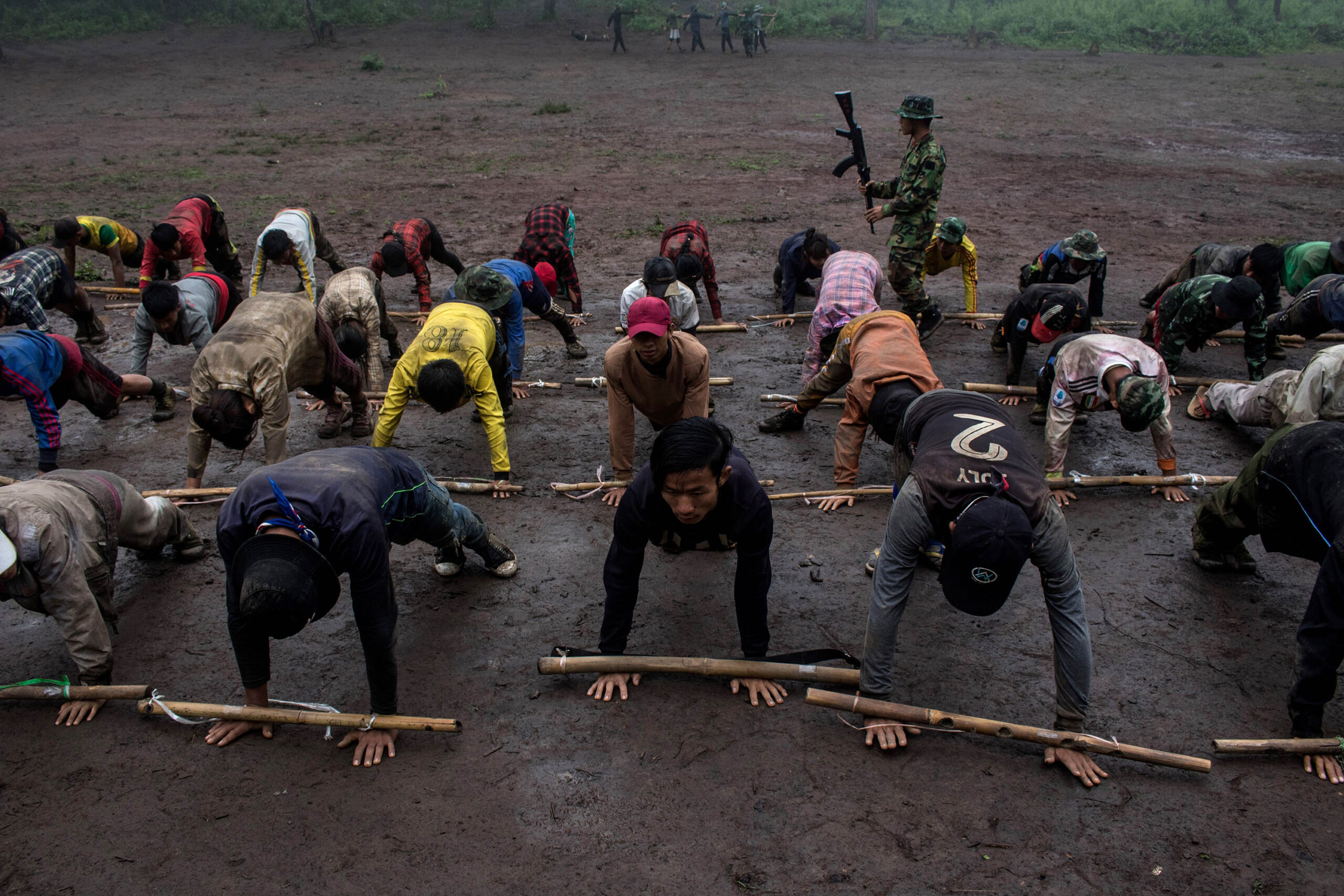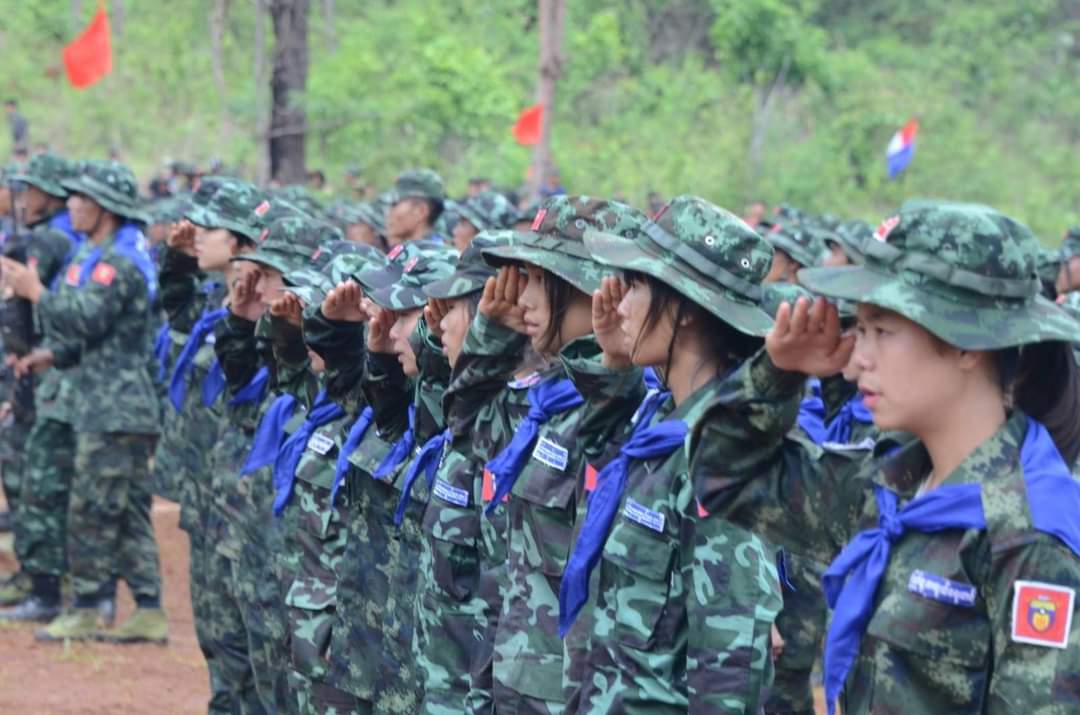U Naing Htoo Aung, permanent secretary of the National Unity Government’s (NUG) Ministry of Defense, talked recently to The Irrawaddy about Myanmar’s armed struggle against the military regime, what the NUG has been doing to step up the attack against the junta, about the availability of funds and the distribution of weapons to resistance groups, and defections from Myanmar’s military.
You have said that the NUG will step up the revolution this year. What’s your current assessment of the revolution?
We have increasingly engaged in all the means helpful to topple the military dictatorship. It is fair to say that we started from zero. We chose armed struggle not because we like it, but because we were forced to do so. Compared to the previous year, there has been a lot of progress. More than one year on from the coup, the regime still lacks legitimacy and is utterly rejected by the people. In terms of military confrontation, the regime has been suffering a lot. This is something that the military had never expected in its history. The armed struggle is one of our means of revolution and it has achieved certain progress. Other means are equally as important as the armed struggle.
You said the NUG will accelerate the armed struggle this year. What is the NUG’s strategy?
The people’s militia is the key strategy, which we will continue to implement in our armed struggle. We are fighting them [the junta] not because we have superior weapons or larger battalions, but because this is a defensive war being fought with the support of the people, and we will therefore continue to pursue the people’s militia strategy. We focused on building and learning in the first year. Now we have a certain amount of experience and stronger organizational skills. Although there are still a lot of requirements in terms of weapons, we have been armed to a certain extent. So this year there will be more attacks designed to cause heavier damage to the regime. Previously, we only waged guerilla warfare, but very soon there will be more all-out attacks carried out in a professional manner.

What will be the major differences in the war between last year and this year?
As everyone knows, we have been able to fight guerilla warfare in wider areas. In the near future, besides guerilla warfare, we will launch assaults in a professional manner. There will be an upgrade to the tactics and weaponry we use in the fighting. Resistance forces will be able to use better weapons and more weapons.
The regime has increasingly used air and artillery strikes to crush the resistance, as well as torching villages. The People’s Defense Forces (PDF) have said they are outgunned. What will the NUG do to help them?
We have been able to raise more funds lately. You can see that resistance forces are using better weapons now. It takes a few months to turn those funds into weapons and get them into the hands of resistance fighters. People have started to see the fruits of the increased funds, and they will see more fruits in the months to come.
You said that the NUG has provided more arms to PDFs compared to last year. Can you give us a figure?
In some cases, supply has yet to reach the target destinations because of logistical hurdles and communication obstacles. We always try our best to reach out to resistance groups. We have supplied arms to Bo Ngar [a prominent resistance leader from Sagaing Region who has complained of a shortage of weapons]. But it is possible that we could not provide as many as they want. We are trying to deliver the arms we have promised. But there are delays due to logistical hurdles, financial constraints, and other factors. We request understanding from the people and resistance forces. There are also delays because we are trying to systematize the supply chains.
As I said earlier, resistance forces can’t get arms overnight after we get the money. The regime has frozen bank accounts used to accept donations from the people, and also arrested account holders. We have to collect donations from numerous sources, and I hope people can understand the extent of the difficulties we are facing. The difference between last year and this year will be that we have spent huge sums on [military] training and research [on weapons production]. We don’t have to spend much on training and research this year, and the extra money will be used to arm the resistance forces.
The NUG said it has spent US$30 million on weapons. Has the NUG received more funds since that money was spent?
There are two parts regarding the use of those funds. Some items directly reach users immediately after we buy them. But for other items, we can’t give them directly and they are still on their way to users. We have used up the US$30 million. But not all the items bought with that US$30 million have been supplied to people yet.
What I can say is that the supply and production of weapons will increase greatly compared to last year. But to tell you the figures….I say it depends on the availability of funds. It costs at least US$1 million to arm a battalion. And we’re doing everything we can to raise more funds. To arm all the existing battalions, it will cost over US$100 million. While we can’t arm all the resistance forces, we are trying to make the most out of the resources we have.

So can we expect more direct attacks against the regime this year?
Yes.
You said the NUG can’t afford to supply all the resistance groups at the same time. But some people have criticized the NUG for only supplying arms to groups it is close to. What is your response?
Resources are limited anywhere and there are always management problems with the sharing of resources. So it is natural that there are complaints in managing scarce resources. We welcome those complaints. But we have to look at the overall picture. For some operations, using large resources on a single unit can guarantee better results than distributing smaller resources to several groups. Basically, we have to fulfill the basic requirements of all the groups to protect the people. And we are trying to make sure of that.
How is the NUG supplying urban guerilla groups, including those taking part in Operation Nan Htike Aung in Yangon?
Many urban guerilla groups are operating under the command of the NUG. We are supplying them based on their planned operations. We are aware that urban guerillas are facing a tougher time now. We are reviewing our supply and making plans for improvement. We have done certain things, but much remains to be done.
What can people expect from the NUG’s attacks for control of cities? NUG statements have said it is expanding its territory and that some cities are under siege.
When we design missions, we have to weigh the benefits against the costs. We have to weigh what we can achieve from the operation and what we and people can lose in the fighting. We know fighting can cause serious damage to human and other resources but, as I have said earlier, we were forced to choose the armed struggle. We aim to build a developed federal democracy in the future. We have to make use of resources in the nation-building. The lives of people and resources are priceless. So we have to think very carefully about how we can achieve our ambitions with minimum losses.
We can seize a town now and make people happy. But we have to use many resources to maintain control of it. This will seriously affect our efforts to liberate the whole country. We may seize cities when the time is appropriate. But we have to take many things into consideration. A wrong decision can cost the lives of many young people. Because we need their strength in rebuilding our country.
What is the NUG doing to help produce weapons for the PDFs?
Our defence ministry has a separate unit for weapons production. The unit provides financial, material and technical assistance for groups that produce weapons. We have achieved significant improvements after numerous failures. We have been able to spend a sizable proportion of our budget on weapons production. We have started to see the benefits of the money we spent on research and development over the last year. We attach great importance to weapons production. But I can’t disclose details of our production line as it is sensitive information. We have spent millions of dollars on weapons production and we will disclose details when the time is appropriate.
Last month, citing the example of Ukraine, the NUG foreign affairs minister called on the international community to provide arms for PDFs in Myanmar. Has the NUG received any weapons from foreign countries?
I don’t know much about foreign relations. But as far as I know no country has yet supplied us. Bur whether we receive help or not we have to keep going on the path we have chosen. We will fight until the end and if the international community give a hand, it will help reduce the damage to the Myanmar people and help restore regional stability more quickly. But if they do nothing, there will be more civilian casualties. It is shameful that the international community just stands by and does nothing when other people face injustice. They should ask themselves the question, let injustice happen or fight it?
How much more money does the NUG need to step up attacks against the regime and can it raise that cash?
As I have said earlier, we need over US$100 million. Suppose we have 100,000 resistance fighters and if we are only to equip them with a basic weapon like a rifle, we need hundreds of millions of dollars. We will have more funds this year than last year. But it will be difficult to meet our financial target. The funds we have acquired so far can only arm some ten per cent of resistance forces. It is quite a small amount compared to the billions of dollars that the Myanmar military gets annually from its defense budget. We need more funds. We have to try to increase funding. It is not impossible if we can work together with greater understanding and unity.
The NUG has formed a logistical army [which requires people to register with the NUG’s defense ministry to provide monthly contributions starting from US$20] which is part of the fund-raising program. How many people have joined the logistical army?
Well, more and more people are gradually joining. But we don’t earn millions of dollars monthly as we expected. We will reveal a detailed list soon.

People are speculating about possible morale problems in the military. What does the NUG know about the current situation inside the military?
For now, Min Aung Hlaing is struggling to convince his troops to continue fighting. For an army to fight and risk their lives, they must have faith in something, for example a cause or to protect the people. But, now, all the people in the Myanmar military have to sacrifice their lives for the betterment of a handful of people. They know if they are protecting the people or persecuting them. They can’t lie to themselves. They might have relatives in villages where they have killed people and torched houses. And the regime is also using the pretext of protecting Buddhism and Burmese people. I think many military personnel are now aware that it is ridiculous.
On the other hand, the PDFs know exactly what they are fighting for. They are fighting to end military dictatorship and establish federal democracy in Myanmar, for the stability and prosperity of Myanmar. They are fighting with the faith that they are building a country that guarantees equal opportunities for all citizens, and that is not ruled through the barrel of a gun. But junta troops do not have such faith. No army can survive long without strong faith. Their morale will decline over time. Those who remain in the military because of the benefits associated with being military personnel will not risk their lives. There are already many unhappy soldiers because of exploitation and bullying in the military. We know that many want to leave the military for the embrace of people, but the regime has taken a number of measures to discourage them from doing so.
People say the Myanmar military has over 400,000 soldiers. Does the NUG know the exact size of the military?
We don’t think the military is as big as they [the junta] say. There have been defections, but troops who defect remain on the paylist. Everyone knows why they are still on the paylist [because commanders embezzle their salaries without reporting their defections to their superiors]. Battalions are short of their standard size. Some say that there are only a few thousand junta troops. That is not true either. Not all the troops are combat troops. And we have seen that the regime has been forced to use non-combat troops in military operations. We learned that the regime has had to use female soldiers in fighting lately. Although we don’t underestimate the strength of the military, its size is much smaller than it claims.
In April, the NUG offered incentives for military personnel to defect. What else can the NUG do to encourage defections?
Soldiers might have concerns about defecting because of the uncertainties they are likely to face after defection. More soldiers have defected as we have guaranteed their lives. So we provide support for defectors to secure livelihoods. We also reward them when they defect with arms. There were difficulties initially, but we can manage more systematically now. We also plan to spend more funds for defectors. Some people have criticized us for spending money on defectors and not on the procurement of weapons. But an enemy soldier that stops fighting for the enemy or defects to us is a military achievement. We are not fighting out of a grudge. We are fighting for a political goal. We are rebelling out of love [for people]. And we keep the door open for those who have not committed serious crimes and who have chosen the people over the regime. This is also important for the revolution.
The NUG has offered US$500,000 to anyone who defects with a military plane or vessel. Has anyone done that yet?
Military personnel have contacted us [about defecting]. It is possible that they will defect [along with a plane or vessel]. We will issue a press release when the time is right.

















